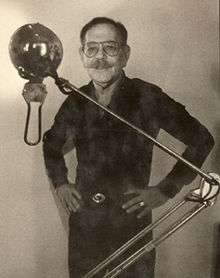Victor Papanek
| Victor Joseph Papanek | |
|---|---|
 | |
| Born |
23 November 1923 Vienna |
| Died |
10 January 1998 (aged 74) Lawrence, Kansas |
| Nationality | American |
| Alma mater |
Cooper Union; Massachusetts Institute of Technology |
| Occupation | Architect |
| Practice | J.L. Constant Professor of Architecture and Design |
Victor Joseph Papanek (22 November 1923 – 10 January 1998) was a designer and educator who became a strong advocate of the socially and ecologically responsible design of products, tools, and community infrastructures. He disapproved of manufactured products that were unsafe, showy, maladapted, or essentially useless. His products, writings, and lectures were collectively considered an example and inspired many designers. Papanek was a philosopher of design and as such he was an untiring, eloquent promoter of design aims and approaches that would be sensitive to social and ecological considerations. He wrote that "design has become the most powerful tool with which man shapes his tools and environments (and, by extension, society and himself).
Early life
Papanek was born in Vienna, Austria, in 1923. He attended public school in England and emigrated to the U.S. where he studied design and architecture. Papanek worked with Frank Lloyd Wright in 1949. He earned his Bachelor’s degree at Cooper Union in New York (1950) and did graduate studies in design at the Massachusetts Institute of Technology (M.A. 1955).
Papanek was interested in humankind as such and pursued an interest in anthropology, living and working for several years with Navajos, Inuit, and Balinese. Indeed, Papanek felt that when design is simply technical or merely style-oriented, it loses touch with what is truly needed by people.
Career
"One of my first jobs after leaving school was to design a table radio," Papanek wrote in Design for the Real World. "This was shroud design: the design of external covering of the mechanical and electrical guts. It was my first, and I hope my last, encounter with appearance design, styling, or design ‘cosmetics’." And further, he opined: "Only a small part of our responsibility lies in the area of aesthetics."
In the same book, Papanek wrote: "Much recent design has satisfied only evanescent wants and desires, while the genuine needs of man have often been neglected by the designer."
Victor Papanek taught at the Ontario College of Art, the Rhode Island School of Design, Purdue University, the California Institute of the Arts (where he was dean), and other places in North America. He headed the design department in the Kansas City Art Institute from 1976 to 1981. In 1981, he became the J.L. Constant Professor of Architecture and Design at the University of Kansas. He also worked, taught, and consulted in Sweden, England, Yugoslavia, Switzerland, Finland and Australia.
Papanek created product designs for the United Nations Educational, Scientific and Cultural Organization (UNESCO) and the World Health Organization (WHO). Volvo of Sweden contracted him to design a taxi for the disabled.
With his interest in all aspects of design and how they affected people and the environment, Papanek felt that much of what was manufactured in the U.S. was inconvenient, often frivolous and even unsafe.
He worked with a design team that prototyped an educational television set that could be utilized in the developing countries of Africa and produced in Japan for $9.00 per set (cost in 1970 dollars). His designed products also included a remarkable transistor radio, made from ordinary metal food cans and powered by a burning candle, that was designed to actually be produced cheaply in developing countries. His design skills also took him into projects like an innovative method for dispersing seeds and fertilizer for reforestation in difficult-to-access land, as well as working with a design team on a human-powered vehicle capable of conveying a half-ton load, and another team to design a very early three-wheeled, wide-tired all-terrain vehicle.
As Papanek traveled around the world, he gave lectures about his ideas for ecologically sound design and designs to serve the poor, the disabled, the elderly and other minority segments of society. He wrote or co-wrote eight books. How could the designer, who must (like others) make a living actually serve ‘real needs’ of human beings? “I have tried to demonstrate that by freely giving 10 percent of his time, talents, and skills the designer can help.” In other words, a willingness to volunteer.[1]
Papanek received numerous awards, including a Distinguished Designer fellowship from the National Endowment for the Arts in 1988. The following year he received the IKEA Foundation International Award.
He died in Lawrence, Kansas, aged 74.
Books
- Papanek, Victor (1971). Design for the Real World: Human Ecology and Social Change, New York, Pantheon Books . ISBN 0-394-47036-2.
- Papanek, Victor & Hennessey, Jim (1973). Nomadic Furniture: How to Build and Where to Buy Lightweight Furniture That Folds, Collapses, Stacks, Knocks-Down, Inflates or Can be Thrown Away and Re-Cycled, New York, Pantheon Books . ISBN 0-394-70228-X.
- Papanek, Victor & Hennessey, Jim (1974). Nomadic Furniture 2, New York, Pantheon Books. ISBN 0-394-70638-2.
- Papanek, Victor & Hennessey, Jim (1977). How Things Don't Work, New York, Pantheon Books. ISBN 0-394-49251-X.
- Papanek, Victor (1983). Design for Human Scale, New York, Van Nostrand Reinhold. ISBN 0-442-27616-8.
- Papanek, Victor (1995). The Green Imperative: Natural Design for the Real World, New York, Thames and Hudson. ISBN 0-500-27846-6.
References
External links
- A "semi-functional" prototype of Papanek's Paper Computer, from Design For The Real World
- The Victor J. Papanek Foundation, University of Applied Arts Vienna
Victor Papanek: Path of a Design Prophet, Al Gowan, 2015, Merrimack Media, Cambridge Massachusetts, ISBN 978-1-939166-72-2